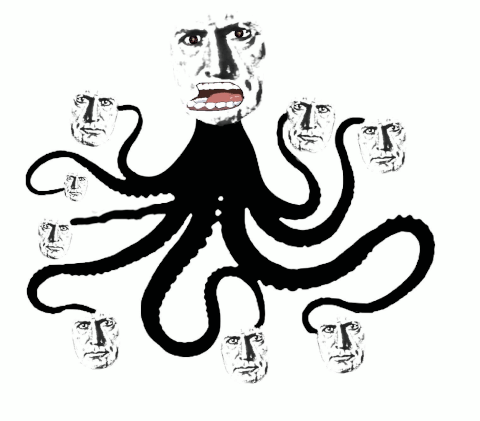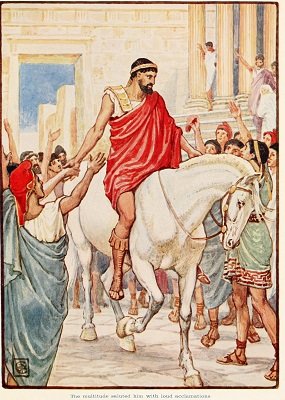My Impression of a Demagogue, and Loyal Followers

Demagogue. Does the word have any true meaning? It is hurled freely by opposing sides in a political debate. But is there objective criteria by which we can judge whether actions or speech do rise to the level of demagoguery? In pursuit of an answer to this question I consulted respected figures in the fields of communication and rhetoric. I not only wanted to understand the term, 'demagogue', but also wanted to learn something about the psychological profile of those most likely to be attracted to a demagogue.
Although I personally refrain from using this term--because it is so often misused and misunderstood--still, given the criteria offered by legitimate sources, it seems the term 'demagogue may be applied reasonably to certain public figures.

Joseph McCarthy, U.S. Politician, 1950s

Picture credit: U. S. Senate Archives. Public domain.
Not many people can boast of having a movement named after them. However, Joseph McCarthy (better known as 'Joe') can lay claim to this distinction. According to J. Justin Gustainis, (Professor Emeritus of Communication Studies at SUNY Plattsburgh,) McCarthy is an "obvious and noncontroversial" candidate for inclusion in the demagogue category.
McCarthy crusaded against communists. He believed communist operatives infiltrated government agencies, the arts, journalism, academia--just about every aspect of U. S. society. He whipped the country into a frenzy with his impassioned speeches about the omnipresent and invisible threat of communism. In pursuit of subversives, McCarthy destroyed the careers, and lives, of many people. In the end, though McCarthy himself was discredited and died a ruined man.
Despite this history, and McCarthy's eventual fall, there are still those who believe in his cause. I actually met one of these loyalists (in the 1990s), a man who held to the belief that McCarthy had been wronged. It is precisely this disconnect, between views of 'experts' and ordinary people, which highlights the difficulty of defining and using the term 'demagogue.

Alcibiades,General in Ancient Greece: Demagogue?

Picture credit: Walter Crane (1845-1915) in The story of Greece: told to boys and girls, by Macgregor, Mary. Public domain.
Alcibiades has been characterized by many historians as a demagogue. This seems to be on the basis of his having given speeches that swayed a crowd to his purpose. He was certainly vain, duplicitous and self-serving, but not all agreed he was a demagogue. Thucydides himself refrained from such a characterization.

The model for my demagogue GIF at the top of the page was someone who has been characterized as a demagogue by many historians. He also had, and continues to have, thousands of devoted admirers. This personality was said to have had a charismatic presence and the gift of oratory. He gave many rousing speeches from his balcony in Rome. Can you guess who he is?
Here he is, giving a speech.

Demagogue and Group Identity
One of the clearest discussions of demagoguery I unearthed was offered by Patricia Roberts-Miller, Professor of Rhetoric and Writing at the University of Texas, Austin. Dr. Roberts-Miller traces the history of the term 'Demagogue' from its origins in ancient Greece, (where once it meant 'leader of the people',) to modern times, where it has taken on quite a different meaning. Generally, when someone uses the term (according to Dr. Roberts-Miller) they suggest that an opponent is employing "effective rhetoric on behalf of a political agenda I don't like."
Dr. Roberts-Miller analyzes common traits of demagogues across time and cultures. She anchors her conclusions in group identification. A demagogue creates the dynamic of an 'ingroup' and an 'outgroup'.

Image created (by me) from two Pixabay (public domain) images:Group and Keep Out
Demagogues, according to Roberts-Miller, are "always polarizing". They describe the world, and people, in "binary paired terms". Something is either strong, or it is weak. Something is either punished or rewarded. In this binary universe, characterizing the 'outgroup' is simple. The ingroup is good. The outgroup is bad. The ingroup is strong. The outgroup is weak. The ingroup deserves reward. The outgroup deserves punishment.
Naive Realism
Roberts-Miller explains that this kind of binary clarity is self-reinforcing. It rejects complicated thinking which might muddle the message. It gives the illusion that one "sees the world exactly as it is". That one is a realist, and others are not. Roberts-Miller calls this perception 'Naive Realism'.

Naive Realism Diagram

Picture credit: Original uploader to Wikimedia Commons was RobinH at en. wikibooks. CC 3.0

The naive realist
According to Roberts' Miller, naive realists, by favoring simple explanations, are subject to confirmation bias., "since people tend to perceive more easily and quickly any information that confirms their current beliefs." This, the professor asserts, not only increases the possibility that one may be wrong, but more regrettably, that one may be wrong "over and over again.'


Pol Pot

Picture credit: Romanian Communism Online Photo Collection under the digital ID 45014X1X4. Free use with attribution.
In Mindful Leadership: Emotional Intelligence Collection, by Harvard Business Review, the authors assert that demagogues spread messages that "elicit negative emotions...a mix of fear and anger". It's "us against them" and fear of what they will take from us. The authors cite as a specific example, Pol Pot.
Another author, Andrew Lam, writing in the Chicago Tribune explains that Pol Pot's message was clear: "The city is corrupt...impure...alien." It is full of foreigners who rule over the poor in rural Cambodia. "The city, therefore, must be obliterated...its residents" re-educated. Pol Pot's obliteration and re-education campaign claimed an estimated two million lives

Rwanda
Photographs of Genocide Victims, Genocide Memorial Center, Kigali, Rwanda

Picture credit: Adam Jones, Ph.D, CC 3.0 license
In 1962, Rwanda gained its independence from colonial rule. A cycle of internecine violence ensued between Hutu and Tutsi populations. In 1994, mass genocide of Tutsis by Hutus was carried out. Classic demagoguery (as defined by the previously cited authorities in this blog) was a powerful instrument in executing the genocide. The message: Tutsi were outsiders, were to blame for Hutu poverty,and were a danger to the Hutus, who "had a right to defend themselves."
Demagogue in All of Us
Ryan Skinnel and Jillian Murphy, writing in Rhetorical Society Quarterly, assert that, "we are all nascent demagogues". The tendency to engage in demagoguery, according to these authors, increases as the level of demagogic rhetoric increases generally. The authors state: "demagoguery requires.. conditions that make it argumentatively effective... When those conditions exist, everyone engages in demagoguery."

Where Does This Leave Us?

Pixabay
I know where it leaves me. There are tools by which to measure behavior if we want to classify something as demagogic. However, I think we ultimately end up in a swamp of accusatory subjectivity. Language is only effective if it is understood. When we speak, it is probably not to an audience of rhetoric scholars. So labeling someone a demagogue will not likely advance our cause.
On the other hand, as an exercise, for our own edification, we might assess the demagoguery of specific public figures. We can measure their behavior according to the criteria set forth by scholars in this blog: Does the figure use polarizing language? Is there an ingroup and an outgroup? Are there simple, binary choices--right/wrong, weak/strong, punishment/reward, us/them?
When we have finished this exercise we can satisfy ourselves that we are probably correct in our assessment. However, our exercise is not likely to have utility in discourse with those who do not share our views.

Writing this blog helped to clarify my thinking and my understanding of demagoguery. It also gave me some insight into those who are persuaded by demagogic rhetoric. I hope you also feel this exercise was worth the effort.

Thank you for reading my blog


Hive on!
Sources
1.Rhetorical Society Quarterly: Demagoguery and Political Rhetoric: A Review of the Literature
5.Parcourir les Collections Thucydides and Alcibiades
13.Harvard Business Review Mindful Leadership: Emotional Intelligence Collection

Illustration Sources Not Already Cited
1.Gif at the top of the page:
Octopus:Pixabay
Mouth:Pixabay
Face:Benito Mussolini 1930 Public Domain
2.Youtube Mussolini speech

Very interesting post. I love the octopus gif!
Thank you very much. That octopus may be ugly, but I guess it is funny:) I appreciate your support.
This an awesome article and you did justice to the topic. I got to learn from this post actually and i now have a better understanding of what a Demagogue means!
It heartens me to see such an endorsement. Thank you very much!
Haha @agmoore, the octopus is too funny!
Nice article again.
Btw. do you know this phenomenon here?
Tell me what you here, very interesting!
Also this one is funny:
I see cyan on grey!
Regards
Chapper
Hi Chapper,
Thank you for appreciating my octopus (and my article). My husband thought the octopus was funny and encouraged me to use it :))
Yanny, definitely 😁 And cyan, no question 😇 I wonder if animals also have such variability in perception? How would we ever test that?
I appreciate your entertaining comment and your support.
Warm regards from crazy, crazy USA these days,
AG
Hey @agmoore,
I also see cyan and hear yanni, that's funny!
Concerning animal perception: I would train an animal on colors and then show them the images.
Maybe they react in a certain manner.
Could this work???
Also warm regards from crazy crazy BRD these days
Chapper
I have to think about that animal experiment :))
From a peaceful corner of a crazy universe,
Warm regards,
AG
@tipu curate
Thank you, very very much!
Upvoted 👌 (Mana: 36/45)
Thank You!
My father took 20 minutes to explain your post.
One more new difficult word that I understand now.
I already knew about fascism (my father lived under it), and this looks like it to me.
Lies can be truth to people.😩
This is my lesson from this.Hi @agmoore.
Hello young friend,
You have a good father. It is a difficult word. Took a whole blog to explain :)
That's a great lesson. Also, we have to be careful that we are not one of those people.
Thank you for a great comment.
Demagogue is a new word for me. But after reading the article, I understood that it is a familiar concept for most of us. We are seeing it right now all across the world.
Thank you for that insight. Yes, all over the world. But of course there have always been demagogues. Still, in a hundred years (if historians are still around to write) I think this period will be compared to the 1930s, when demagoguery was like a contagion. Why? I guess we can see some common threads, but I think we'll need a hundred years to see those causes/patterns clearly.
I very much appreciate your feedback.
Someone was arguing that these patterns are like waves. It comes and goes. but doesn't disappear altogether.
My Internet connection went down just as I was replying last night...glad it did because I remembered a statement from one of my references this morning:
I'm not sure that's true, but what it does address is that some environments are more receptive to demagoguery. I would guess (no study to cite) that a discontented population is one of those environments. When people are unhappy they look for extreme solutions, and scapegoats. Demagogues offer that. The level of discontentment rises and falls over time, and so perhaps the "waves" of demagoguery. Of course, this is just conjecture :)
Same thoughts here too..
Congratulations @agmoore! You have completed the following achievement on the Hive blockchain and have been rewarded with new badge(s) :
You can view your badges on your board And compare to others on the Ranking
If you no longer want to receive notifications, reply to this comment with the word
STOPSupport the HiveBuzz project. Vote for our proposal!